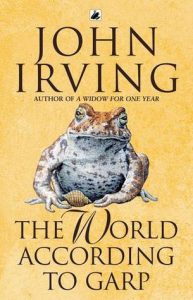

In rewriting this new introduction to Garp, of course I found things to cut or change in that 1998 afterword, and I found a lot of necessary things to add. Rewriting is the unglamorous part of creating, but revision is essential for clarity. Twenty years ago, which was twenty years after The World According to Garp was published, I wrote an afterword to the novel. As he says in the following introduction to the anniversary edition, exclusive to, he did not anticipate the dark themes of his comic novel to be so timeless: "It’s not good news that Garp is still relevant." To celebrate the 40th anniversary of Garp' s publication (and its first ebook edition), Irving looks back on his groundbreaking novel and considers how it reflects our current times-a truth he did not expect when he was writing it decades ago. Two of its central themes are those of sexual violence and intolerance, subjects that Irving felt were at their peak when he was writing the book that would make him a household name. Its scope is large, its storytelling Dickensian, and it perfectly encapsulated contemporary American culture at its most divisive and malignant. Garp, Irving's comic novel is full of idiosyncratic characters-the successful writer Garp, his accidental feminist icon mother, a former football player turned transgender activist, and a supporting cast of assassins and suburban seductresses and cult members and unicycling bears and fortune tellers. Following the life of its titular character T. Four decades later, The World According to Garp remains one of Irving's most masterful books. The masochistic gifted-victim game has been played in recent American writing on just about every conceivable level, but Irving's novel is still something special: he created a whole hideous and deformed women's political group (the Ellen Jamesians) in order to have his author-hero, his alter ego, destroyed by it, and the film is faithful to Irving's "vision.In 1978, John Irving published his fourth novel-the one that became his first bestseller. If you listen to what Garp (Robin Williams) says, the movie is about love of family if you look at what happens, though, it's a castration fantasy. Tongues, ears, penises, eyes, lives-everybody on the screen is losing something. This isn't necessarily bad-Hill's pastel, detached, and generally meaningless comedy may, in some ways, be preferable to the baroque apparatus that Irving constructed-but in recounting the book's key incidents Hill and Tesich lay bare the pattern of mutilations in the plot. Pauline Kael gave this movie a middling review: "The movie version of John Irving's novel, directed by George Roy Hill, from a script by Steve Tesich, has no center it's a simple series of vignettes, spanning Garp's life from his beginning to his end.


 0 kommentar(er)
0 kommentar(er)
